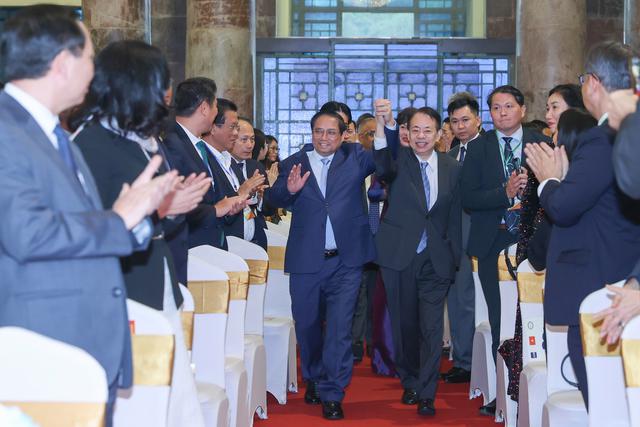The Asian Development Bank (ADB) plans to mobilize resources of up to $3 billion for some 23 projects in Vietnam during the 2023-2026 period, ADB President Masatsugu Asakawa said at celebrations for the 30th anniversary of the Vietnam - ADB partnership, organized by the State Bank of Vietnam (SBV) and the ADB on March 13 and attended by Prime Minister Pham Minh Chinh.
Relations have developed rapidly over the 30 years and many key achievements have been recorded. Vietnam is one of the ADB’s most active partners, with total support for the country now standing at about $18 billion. Mr. Asakawa reaffirmed the ADB’s commitment, emphasizing that it is always interested in helping Vietnam realize its important and ambitious goals.
Prime Minister Chinh, meanwhile, affirmed that the Vietnamese Government considers the ADB an important, close, trustworthy, and effective development partner. He affirmed that its support motivates and inspires other partners to help Vietnam, making an important contribution to the achievements the country has posted on its path to innovation, international integration, and sustainable development.
He also touched on a number of lessons about cooperation between the two sides. It is necessary to closely follow the situation; clearly identify goals and tasks for cooperation to be successful; and implement tasks with focus as a developing country with a lot of work to do. All levels, sectors, and localities, he went on, must appreciate and effectively use the ADB’s support to combat negativity and corruption.
Thirty years on, the cooperation between Vietnam and the ADB is in its most mature stage. Vietnam and Japan, meanwhile, have become Comprehensive Strategic Partners, and cooperation between the two sides has no limits, as noted by Japanese Prime Minister Kishida Fumio, especially regarding science and technology and innovation.
Therefore, cooperative activities between the ADB and Vietnam need to be more focused, especially on development investment, programs, and projects that can turn around a situation, instead of simply focusing on the goal of hunger eradication and poverty reduction, as in the previous period, using innovative thinking, methods, and procedures.
The Prime Minister hopes that the ADB will continue to support Vietnam in terms of capital, technology, institution building, governance capacity, human resource training, and policy advice, to create motivation and inspiration for other development partners, as well as in implementing programs and policies to promote sustainable growth, improve the competitiveness of the economy, and implement the country’s development goals to 2030 and 2045.
He also proposed that cooperation between the two sides focus on a number of key areas, such as climate change response, strategic infrastructure projects, especially in the Mekong Delta, and emerging fields such as semiconductor chips, the digital economy, the green transformation, the circular economy, the sharing economy, and private sector development. In particular, the response to climate change includes fields such as electricity, transportation, and agriculture, all of which are being drastically implemented.
Prime Minister Chinh added that Vietnam has announced a plan to implement the Just Energy Transition Partnership (JETP) and is making efforts to complete the plan for implementing the National Power Development Plan VIII (PDP 8), for promulgating in March, and on that basis, specific projects will be issued to use funding from the JETP of the G7 and the Energy Transition Mechanism (ETM) of Japan.
He asked the ADB to continue providing comments to Vietnam on regulations, institutions, and procedures, so that Vietnam can refer to the legal experience of other countries.
The Prime Minister also asked it to continue providing policy advice, especially macro-economic policies and monetary and fiscal policies appropriate to the current rapidly-changing situation, both in the immediate and long term, especially in the face of unforeseen crises.
Meanwhile, Mr. Asakawa expressed his appreciation of Vietnam’s participation in resolving global issues, such as empowering women and, especially, its commitment, vision, determination, effort, and solutions in response to climate change and achieving net-zero emissions by 2050.
The ADB has committed $2.1 billion to Vietnam to implement the JETP and the ETM, which is a new financial tool for coal-fired thermal power plants to cease operations and use cleaner energy sources.
It is ready to continue to support Vietnam in arranging capital sources for projects in areas the Prime Minister has identified, such as energy transition, large-scale infrastructure, public-private partnerships (PPPs), emerging industries such as AI, deeper participation in the global semiconductor supply chain, developing the private sector, and contributing to unlocking private investment capital as well as FDI.
Commenting on Prime Minister Chinh’s close direction on cooperative activities between the two sides, he said the ADB will not only better meet Vietnam’s requests and desires for support but also simplify processes and procedures, as the Prime Minister proposed.
SBV Governor Nguyen Thi Hong, meanwhile, emphasized the ADB’s role and contribution to Vietnam’s development in general and its valuable support to the banking sector in particular, through technical assistance, policy advice to the central bank, loan programs, and trade finance for commercial banks.
The SBV will continue to actively and proactively coordinate with the ADB and other financial and monetary institutions the central bank represents to mobilize more resources to support the government, ministries, branches, and localities in achieving socio-economic development goals.









 Google translate
Google translate